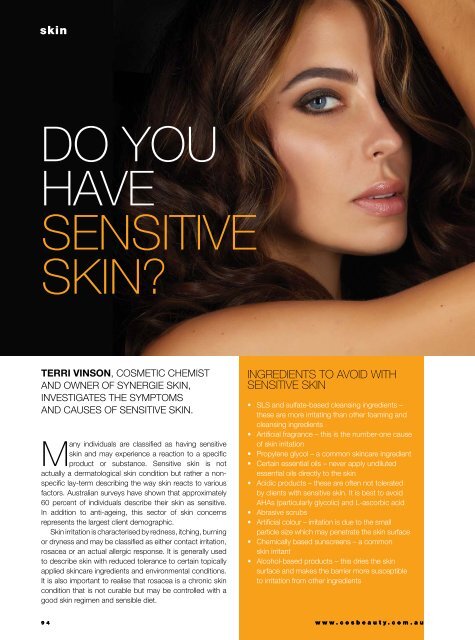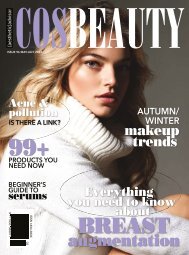Cosmetic Surgery and Beauty Magazine #67
Cosmetic Surgery and Beauty is the go-to magazine for anyone considering an aesthetic procedure. Covering a huge range of treatments with in-depth expert interviews and hundreds of before and after photos.
Cosmetic Surgery and Beauty is the go-to magazine for anyone considering an aesthetic procedure. Covering a huge range of treatments with in-depth expert interviews and hundreds of before and after photos.
You also want an ePaper? Increase the reach of your titles
YUMPU automatically turns print PDFs into web optimized ePapers that Google loves.
feature skin<br />
Do you<br />
have<br />
sensitive<br />
skin?<br />
Terri Vinson, cosmetic chemist<br />
<strong>and</strong> owner of Synergie Skin,<br />
investigates the symptoms<br />
<strong>and</strong> causes of sensitive skin.<br />
Many individuals are classified as having sensitive<br />
skin <strong>and</strong> may experience a reaction to a specific<br />
product or substance. Sensitive skin is not<br />
actually a dermatological skin condition but rather a nonspecific<br />
lay-term describing the way skin reacts to various<br />
factors. Australian surveys have shown that approximately<br />
60 percent of individuals describe their skin as sensitive.<br />
In addition to anti-ageing, this sector of skin concerns<br />
represents the largest client demographic.<br />
Skin irritation is characterised by redness, itching, burning<br />
or dryness <strong>and</strong> may be classified as either contact irritation,<br />
rosacea or an actual allergic response. It is generally used<br />
to describe skin with reduced tolerance to certain topically<br />
applied skincare ingredients <strong>and</strong> environmental conditions.<br />
It is also important to realise that rosacea is a chronic skin<br />
condition that is not curable but may be controlled with a<br />
good skin regimen <strong>and</strong> sensible diet.<br />
Ingredients to avoid with<br />
sensitive skin<br />
• SLS <strong>and</strong> sulfate-based cleansing ingredients –<br />
these are more irritating than other foaming <strong>and</strong><br />
cleansing ingredients<br />
• Artificial fragrance – this is the number-one cause<br />
of skin irritation<br />
• propylene glycol – a common skincare ingredient<br />
• certain essential oils – never apply undiluted<br />
essential oils directly to the skin<br />
• Acidic products – these are often not tolerated<br />
by clients with sensitive skin. It is best to avoid<br />
AHAs (particularly glycolic) <strong>and</strong> L-ascorbic acid<br />
• Abrasive scrubs<br />
• Artificial colour – irritation is due to the small<br />
particle size which may penetrate the skin surface<br />
• chemically based sunscreens – a common<br />
skin irritant<br />
• Alcohol-based products – this dries the skin<br />
surface <strong>and</strong> makes the barrier more susceptible<br />
to irritation from other ingredients<br />
94 www.cosbeauty.com.au


















